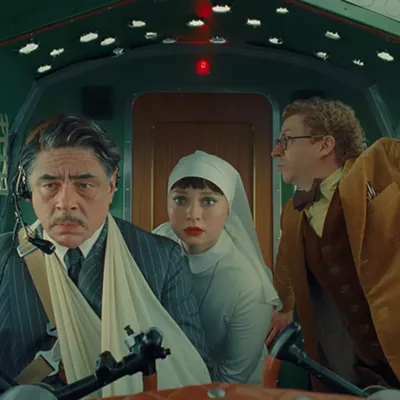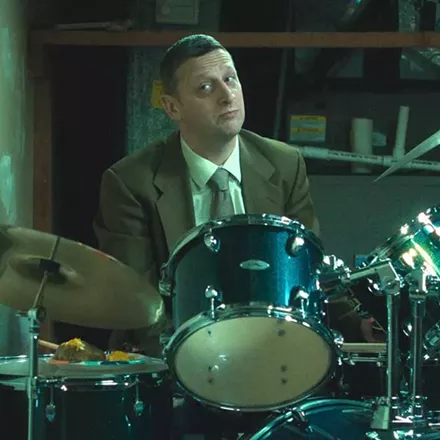What many fans of director Kathryn Bigelow have been waiting for is another great film from her. Among the great ones she's already done are Near Dark, Point Break and Strange Days. There was some pulse-pounding stuff to be found in each of them, and with Strange Days, Bigelow brought to the screen an intense, swirling, apocalyptic vision. Her next one, The Weight of Water, with, for those who are interested in such things, a nude scene by Elizabeth Hurley, never even opened in the U.S. And now we've got K-19: The Widowmaker, the mostly true story of a Russian submarine crew that was put in major peril by a leaking nuclear reactor off the East Coast of the U.S. in 1961, at the height of the Cold War.
It's a Bigelow film all right, complete with offbeat visuals, lots of tension, serious situations getting worse by the minute, and more. But it's also bloated and brooding, slow-moving and much too long, and filled with example after example of desperate men making nonsensical decisions. No, this is not another great film from her.
Liam Neeson, sporting a slight hint of a Russian accent, is the short-tempered captain in command of the new Russian super sub, K-19. He can't stand bureaucrats.
A quick note: Billboards all over the country originally showed the sub with a big "K-19" painted on its conning tower. But in the film, even though that's the code name of the sub, the big white paint on the same tower reads "294." None of that is ever explained, but to make sure audiences aren't confused, the billboards have been painted over, a la "White Out," so now nothing is painted there. It's just a splotch.
Things are going wrong in early tests of the sub, so the Russian bureaucrats in the military decide to send a different captain to take over -- to "supervise."
That would be the serious-minded Harrison Ford, with a slightly stronger, but still faux, accent.
But the problem isn't with whoever is commanding the brand-new submarine. It's the fact that it's filled with defective parts that are going to keep breaking, no matter who's in charge. And that's what the film ends up being about. When the new captain immediately dismisses the vessel's lone nuclear reactor expert for being drunk, replacing him with a fresh-out-of-school reactor operator, the reactor starts leaking. And no one, especially the green schoolboy, knows what to do.
So there's the peril, and that part of the film is played out well. Things get worse, men get sick, the core temperature rises, and there's talk of a possible onboard explosion -- a huge one -- that, because the sub is just off the American coast, will likely lead to the start of World War III.
The story could have been interesting just staying at that level. But a leap into darker territory is explored when the tensions between the two captains start to spin out of control. They just don't get along; Neeson, forced to take orders from Ford, has no power to do anything about it. His anger grows. There are long, dull speeches from each of them.
While these two storylines keep bouncing off each other, Bigelow takes the time to show her chops. She tosses in some old-style editing tricks such as putting her camera on one swinging object, then cutting over to another, larger one. And she pulls off some flashiness in a sequence that has the camera looking at men inside the sub, pulling back through a wall to the hull, then pulling back even more to end up outside in the deep waters, with fish swimming all around. It's a spectacular bit that loses all of its power when she repeats the shot an hour later.
But there's a lot more wrong with the film than that. During the last couple of reels, all hell seems to have broken loose when it comes to the script remaining logical. Knowing how much trouble they're all in, Neeson suggests to Ford that there's a NATO post nearby that they could make it to. But Ford counters with the angry response that they will get no help from the enemy. And that's just the beginning of a long series of what amounts to men under great stress not being able to make up their minds. Not only is there a lot of waffling, there's also talk of mutiny. Back in Moscow, the talk among those bureaucrats is that one of their fine officers has turned traitor, simply because they've lost radio contact.
Everything near the end becomes a back-and-forth mishmash that looks and feels like there's no guiding hand.
And when, finally, everything is resolved, the film switches to a pointless sequence 28 years later in which one of the surviving principals gets to make -- watch out -- one more long, dull speech.
















